- Home
- Douglas Clegg
Dark Rooms: Three Novels
Dark Rooms: Three Novels Read online
Table of Contents
The Hour Before Dark
Breeder
Afterlife
Praise for Douglas Clegg’s Fiction
“Clegg’s stories can chill the spine so effectively that the reader should keep paramedics on standby.”
—Dean Koontz, New York Times bestselling author.
“Douglas Clegg has become the new star in horror fiction.”
—Peter Straub, New York Times bestselling author of Ghost Story and, with Stephen King, The Talisman
“Douglas Clegg is the best horror novelist of the post-Stephen King generation.”
— Bentley Little, USA Today bestselling author of The Haunted.
“Clegg gets high marks on the terror scale…”
—The Daily News (New York)
THE HOUR BEFORE DARK
Douglas Clegg
ALKEMARA PRESS
Get book updates, exclusive offers, news of contests & special treats for readers—become a V.I.P. member of Douglas Clegg’s long-running free newsletter.
BONUS: Sign up now to get a special free ebook for a limited time only.
Click here to sign up and get your free ebook.
Click here to explore more fiction by Douglas Clegg.
"Here comes a candle to light you to bed, And here comes a chopper to chop off your head."
—traditional nursery rhyme
"There are only two ways to live your life.
One is that nothing is a miracle.
The other is as though everything is a miracle."
—Albert Einstein
PROLOGUE
1
A nightmare:
"Do you want to play the Dark Game?"
"No."
"What are you afraid of?"
"You."
2
The rules for the Dark Game are simple:
First, you need to close your eyes. Do not open them. If necessary, you can use a blindfold. In fact, because kids usually can't keep their eyes closed, blindfolds are recommended.
Second, you need to stay very still for a long time and block out all noise, except for the voice of the chosen master of the Dark Game. You must also block out all smell and all touch, except for the others whose hands you're holding. You have to join hands and form a circle. But block out everything you can.
Except the voice of the master of the Dark Game.
Third, someone has to be in control of where the Dark Game goes. To recite the litany that begins it. To direct your mind into the game.
And lastly, you must never play the Dark Game once it's dark outside.
At night, it becomes too real. You lose control of it. You can't stop it after dark.
You must start the game in the hour before dark, sometimes called the Magic Hour.
You must stop playing when night falls. Because that's when it changes.
Sometimes, you can't get out of the Dark Game once the dark comes.
It becomes real then.
It takes you over.
3
A nightmare:
On the other side of the door, the voice again: "Don't be afraid."
The door swings wide, and from outside, an eternal twilight, a shadow sweeps in.
"I am here."
"I won't play the Dark Game," I whisper.
"Too late. You can't stop playing it."
4
I've come to believe that absolute evil has a human face.
And absolute innocence is the brother of evil.
I was once innocent, but then I began playing that game.
5
When I was nine, I went wandering on a chilly early evening.
My father owned a vast property called Hawthorn, which included a house, some woods, and a smokehouse, as well as a stream and a duck pond. It seemed like an endless world to me then.
A man found me in the woods—a man whose face I have somehow erased from my memory as part of a feverish week that vanished for me as a child.
He told me that I had blood on my face. He washed it off in an ice-cold stream, splashing it all over my forehead and hands. I felt as if I'd been bitten by mosquitoes—even in the middle of winter.
He walked me through the night-smitten woods until we approached the back of my home.
It was a moment out of time that I could not place within my other memories—why I had wandered, or why I had what might've been blood on my face, or even the face of the man who had washed blood from me.
That was childhood; it ended; I closed its door; I grew up and moved away.
Many years later, when he was in his fifties and I was in my late twenties, my father wandered at twilight and opened the door to a mystery.
PART ONE
CHAPTER ONE
1
It attacked with the ferocity of a wild animal.
2
At the point my father, Gordie Raglan, entered the smokehouse, his life was nearly over.
Even if you'd told him that, it probably wouldn't have stopped him.
Knowing my father, he probably had been thinking about the Boston Celtics and if they were going to kick any ass that winter. Or whether he was going to have shepherd's pie without peas for supper when he got back. Or how he was going to repair the half-rotted roof of the cabin down by the duck pond when he knew he should just let the cabin fall apart.
He was a guy who was fairly transparent in his thinking and, though smart, was a simple man. He liked his world to be orderly.
He always looked to me—in photographs and my childhood memories—like a solid structure. A man created for purpose, duty, and care. Even at his worst (he had his terrible days, as all fathers will), he seemed a moral compass within a world spun out of control.
He liked the people around him to be somewhat predictable, which is no doubt why he remained on Burnley Island most of his life. His main loves were, in fact, the Boston Celtics, what was for supper, home repairs, and his daughter's two dogs, which, by right of whose house they lived in, were his as well. They were rescued greyhounds named for Welsh legend (Mab and Madoc) and might've met terrible fates if he and my sister, Brooke, hadn't gone over to the racetrack in Rhode Island a few years previous to grab two pups that weren't quite right for racing.
Perhaps all he thought about was what was bringing him out in the storm in the first place. There were, at the time, a thousand guesses for this, but none of them got near the mark.
He hadn't called the dogs. This was unusual for him. He might go out to see who was in the driveway or what a certain noise had been, but he nearly always called the greyhounds out when he did that.
Not that he went out often at twilight or most evenings. Not that Mab and Madoc would've gone with him—those dogs dreaded foul weather as much as they did the local veterinarian's office.
But still, he would've called them. If he had, Brooke would've known he was leaving. She was at the other end of the house—down the boxcar hallways that led like a puzzle from one room to another without end, built that way by some ancient Raglan with a bizarre sense that every room should open on another room. Brooke was down in what was called the second Great Room, with the dogs at her feet. Reading a mystery novel, halfway falling asleep, having been up most of the previous night.
That afternoon, Gordie Raglan had drunk half a mug of hot cocoa before he left the house. He had a fondness in November for comfort foods—chicken soup, warm cocoa, and shepherd's pie. Cocoa was his favorite. He loved it more laced with a bit of bourbon, but this particular night there was nary a drop in the house.
He no doubt had chewed gum as he headed for the front door—Wrigley's Spearmint or Big Red, either one could be his favorite of the day. He wore his fu
nny red cap that once belonged to one of his sons, but to which he had become attached over the past several years. He drew on a parka that he'd received as a present the previous Christmas. There were boots by the door, but he chose to wear his scuffed, ten-year-worn Oxfords. It was his storm outfit. No umbrella. Dad didn't believe in umbrellas.
The cap made him look youthful or silly, depending upon who was asked about it. His peppered gray hair no doubt stuck out of its sides. My father was generally late with haircuts once November had begun, unless his daughter had been after him about it.
He rarely left the house after three or four in the afternoon anymore, unless something needed immediate attention around the grounds of his home.
But something got him outside, during the storm.
3
Barely light out, the fury of the storm brought an early veil of darkness with it.
Something made him put down the mug, slip on his shoes, leaving them untied as he went out the front door of his home. He had a flashlight with him. Around the house, he always kept a flashlight by his side, as much as he kept the kerosene spot heater in whichever room he chose to occupy.
Only a man as stubborn as Gordie Raglan would've traipsed out in the worst storm of November to do some mysterious errand in what amounted to a rundown stone shelter that had been locked up for years.
It had been a tempest out at sea, but on the island it was a rough kind of magic—a Nor'easter blowing down across the bogs and ponds and the slips and beaches, through the woods with their sheltering pines, with all the beauty that a terrific storm brings—the overly dramatic light of creation itself swirling through that island.
(I had loved the winter storms when I was a boy. I had gone out into them sometimes and held out my arms—imagine a boy of ten doing that—as if it were my own magic power that brought the wind and rain.)
This particular night the rain was incessant.
Maddening.
The lightning, a constant flashbulb in the eyes. Thunder roared overhead like drunken Nordic gods.
He must've been swearing under his breath, given his limp and what he had always called the "old pain," doubly frustrated, for at one point his left shoe went into the mud, deep.
He left it there, a few feet from the entrance to the smokehouse.
The smokehouse itself was hardly much of a shelter. It was a small one-room stone house that had at one time been the place where meat was hung to smoke and dry. It had been kept locked for years.
He had the key with him.
4
He would not have been considered tall by any stretch of the imagination, but there was something in his broad shoulders and barrel chest that indicated a large, imposing figure.
Upon entering the small room, he no doubt smelled the old smoky odor and the pungent stink of earth in the air. Behind him—and I'm guessing—the door slid shut, creaking with the wind that howled outside.
He spun around, annoyed.
The rain had been coming down in sheets for nearly an hour. He directed the flashlight's beam to the small, thick square of glass that was the only window. The sky darkened with clouds and a somber grayness. The door banged back and forth briefly, then shut again. Branches scraped the low rooftop.
He glanced back into the darkness, perhaps.
Then up—the ceiling, highest at about six feet, was arched.
He looked back at the door and its window.
The square of light through its glass.
Twilight outside. Rain began hitting the window.
He shot the flashlight beam around the ceiling. He glanced down along the rough stone walk.
He might have heard what would be a clash of metal, like a knife being sharpened on stone.
He heard some noise—perhaps someone behind him?
The first slice came down on his shoulder.
He dropped the flashlight.
The next slice caught him on the back of the leg. Something stung the place between his shoulder blades. A cold blade thrust into his back.
After an hour, the flashlight's beam grew feeble.
He was not yet dead.
The door to the small stone structure swung back and forth, and then closed again.
It grew dark outside, from descending night and the storm. Branches of the old hawthorn trees scraped the roof as rain battered down. Lightning flashed across the gently sloping hills and rocky pastures, followed by a rolling boom of thunder.
The storm, which had begun off the coast farther south and had ridden up into New England on the jet stream, howled and screamed and groaned through the night.
The lights went out at the farmhouse that stood less than a mile away as the rain turned to sleet and then snow with the falling temperature.
The first snow of the year swept through on the heels of the storm. It frosted the fields and woods.
There was something about the New England woods, and in particular, this island off the Atlantic coast, off Massachusetts, that created a very real isolation within the beauty of a winter storm.
The first snow, a dusting across pine and oak, with the last stalks of balding pasture thrust up through glittering whiteness.
A pastoral moment: farmhouse in the distance, the stone smokehouse, the swirls of fine snow, the smell of wood-fire in the air from chimneys near and far, and the night, as it descended.
5
This is the story of my family.
Call me Nemo, for that was the name my sister saddled me with when I was a kid. It stuck. Other things stuck from childhood, as well—including the Brain Fart.
The Brain Fart was a week in the memories of my brother, sister, and me that had just disappeared without warning. We imagined it, after a while, as an enormous gassy cloud that had shot out of our ears and floated like mist somewhere above the island before drifting off to sea. By the time I'd turned twenty-eight, that Brain Fart seemed to hover in the air again. None of us knew what had caused the Brain Fart. It had seemed spontaneous, although a certain amount of fever had accompanied it. We had lost a week, which, for children like us, seemed like an entire season.
I suspected even then that the week of the Brain Fart was important. In the end, I guess it was.
But the beginning was my father, and how he had walked into the smokehouse and set in motion a mystery that drew me back to the island in the first place.
And how my sister, Brooke, had found him.
CHAPTER TWO
1
"What we do in life that determines who we are, we do alone," my father told me when I was much younger and had done something that was no doubt terrible. I can't recall what it was I'd done, but his words had been engraved in my brain since then.
He also was a great proponent of the phrase "Even one person can make a difference in the world. Even the smallest among us."
He was one of those fathers who had these kinds of chats with his children.
2
The current smokehouse was built sometime before 1850. It had once been used for smoking fish and meat for my great-great-greats. There had been another smokehouse on the same spot before 1845, but the story was that it had burned down, for it was made of wood. The stones were local, quarried at what was, for most of the twentieth century, a rocky area and a pit full of water, out among the pines just two miles to the north of the property. The newer stone smokehouse had remained intact for more than 150 years. In his lifetime, my father only once had to replace the roof, long before I was born, after a hurricane had hit the island. It had a dirt floor when we'd been children. At some point, my father had set down oak planks, then put another set of pine planks over these as a kind of floor. He'd used pegs and nails to connect the boards, but it had been a very rough, uncouth floor that had warped a bit over the years.
It was always cold in the smokehouse, no matter what the season.
When I was very little, my siblings and I used the smokehouse as something of a hideaway to play games in; then, when it became
the place of all punishment for us (spankings, lessons-to-be-learned-from-our-misdeeds, and the Time-Out room), the place lost its enchantment. I mainly remembered it for being nasty and chilly, and for making me feel as if I were going to be trapped inside it forever and no one would ever come get me.
Years later, my father put a dead bolt on it because he said that he found two summer people making out in it (I suspect now that they were doing more than making out). The smokehouse became mainly just another object of quaintness on our property, of equal interest as the duck pond and the old pump out back.
3
A reconstruction of the crime scene:
The door battering, the flashlight on the wood slat floor, the way his body was positioned when he'd been found, and the approximate time of the electricity going out at the house.
His shoe, in the thick mud.
His hands, severed at the wrists.
The blood, which had made the first policeman on the scene think that the floor and walls had been painted a messy red.

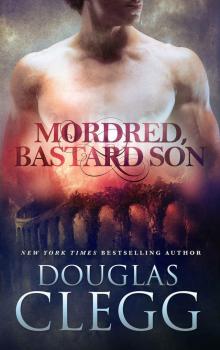 Mordred, Bastard Son
Mordred, Bastard Son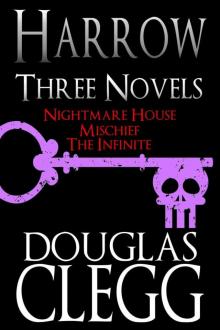 Harrow: Three Novels (Nightmare House, Mischief, The Infinite)
Harrow: Three Novels (Nightmare House, Mischief, The Infinite)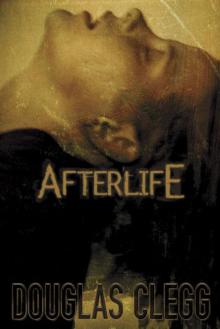 Afterlife
Afterlife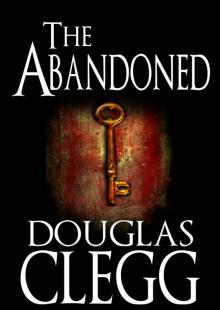 The Abandoned - A Horror Novel (Thriller, Supernatural), #4 of Harrow (The Harrow Haunting Series)
The Abandoned - A Horror Novel (Thriller, Supernatural), #4 of Harrow (The Harrow Haunting Series)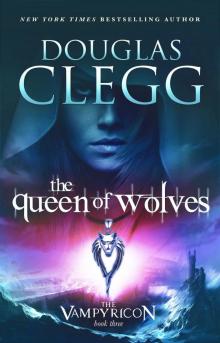 The Queen of Wolves
The Queen of Wolves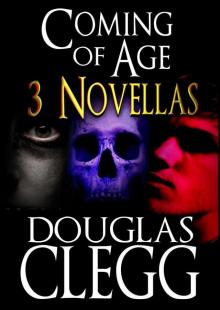 Coming of Age: Three Novellas (Dark Suspense, Gothic Thriller, Supernatural Horror)
Coming of Age: Three Novellas (Dark Suspense, Gothic Thriller, Supernatural Horror)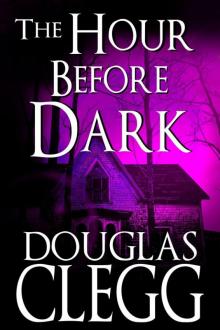 The Hour Before Dark
The Hour Before Dark Isis
Isis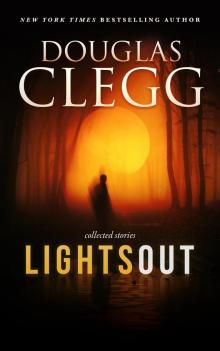 Lights Out
Lights Out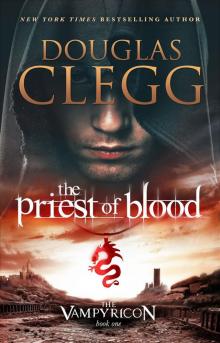 The Priest of Blood
The Priest of Blood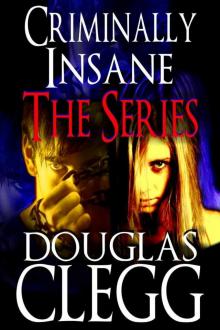 Criminally Insane: The Series (Bad Karma, Red Angel, Night Cage Omnibus) (The Criminally Insane Series)
Criminally Insane: The Series (Bad Karma, Red Angel, Night Cage Omnibus) (The Criminally Insane Series)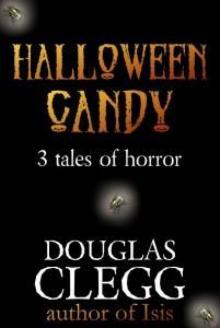 Halloween Candy
Halloween Candy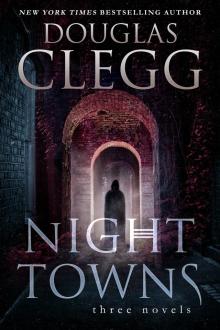 Nights Towns: Three Novels, a Box Set
Nights Towns: Three Novels, a Box Set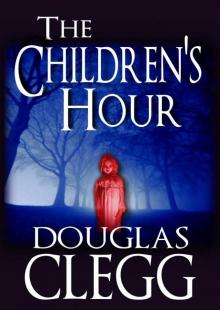 The Children's Hour - A Novel of Horror (Vampires, Supernatural Thriller)
The Children's Hour - A Novel of Horror (Vampires, Supernatural Thriller)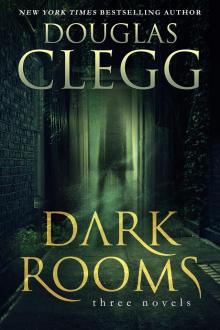 Dark Rooms: Three Novels
Dark Rooms: Three Novels![[Criminally Insane 01.0] Bad Karma Read online](http://i1.bookreadfree.com/i2/04/10/criminally_insane_01_0_bad_karma_preview.jpg) [Criminally Insane 01.0] Bad Karma
[Criminally Insane 01.0] Bad Karma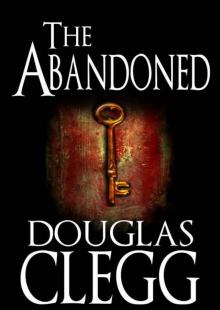 The Abandoned - A Horror Novel (Horror, Thriller, Supernatural) (The Harrow Haunting Series)
The Abandoned - A Horror Novel (Horror, Thriller, Supernatural) (The Harrow Haunting Series)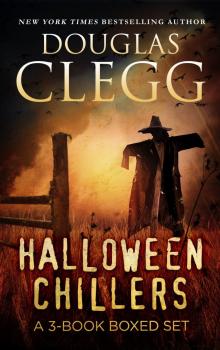 Halloween Chillers: A Box Set of Three Books of Horror & Suspense
Halloween Chillers: A Box Set of Three Books of Horror & Suspense